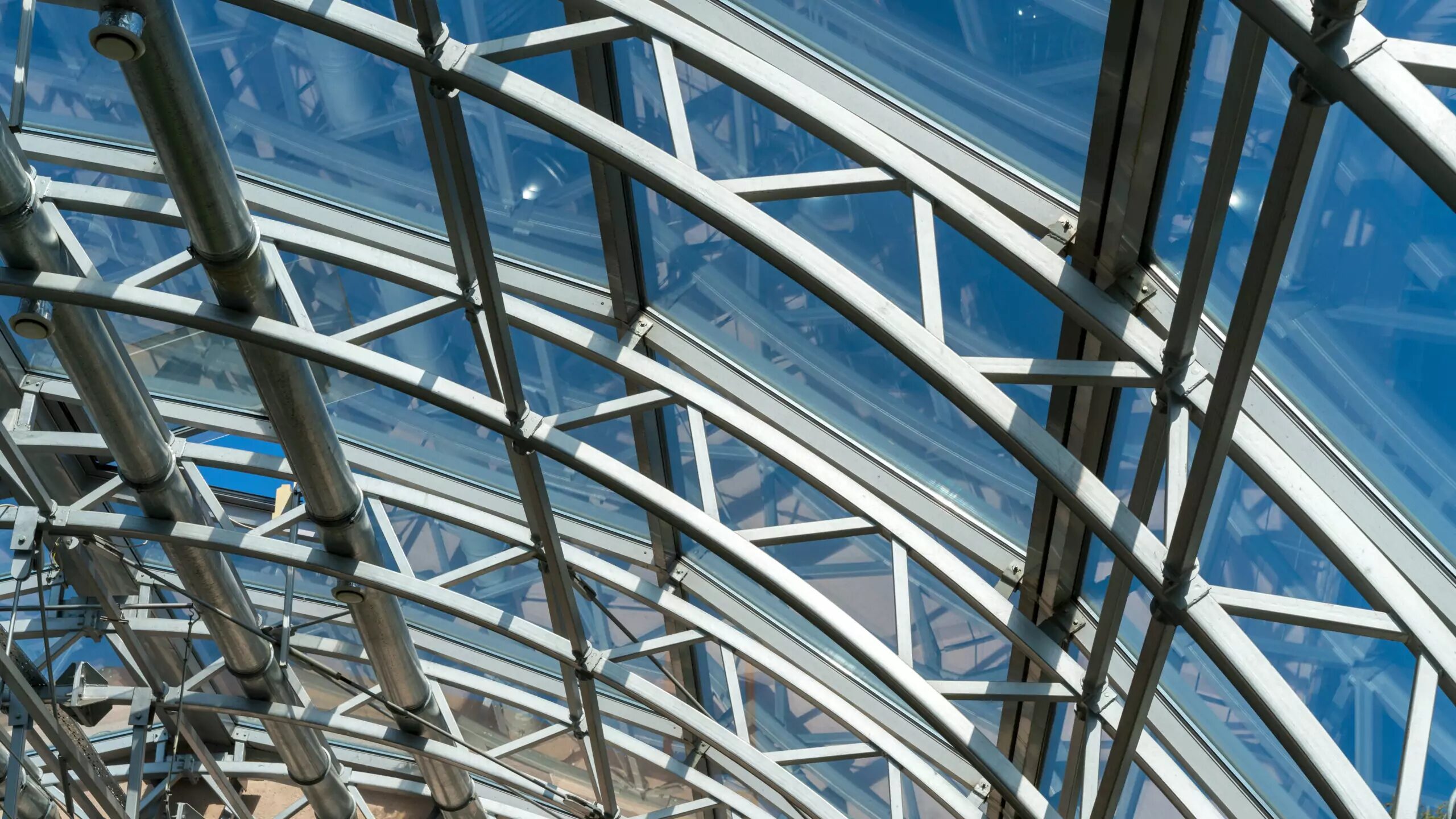
Polycarbonate is a transparent, lightweight, and highly impact-resistant material that has gained significant popularity as an alternative to conventional glass. Its remarkable properties, such as high transparency, impact resistance, and thermal stability, make it a preferred choice for various applications across multiple industries. In this article, we’ll explain what polycarbonate glass is and share four example use cases of polycarbonate sheets, including their use as a construction material, in the bus and rail industries, in bulletproof glass-making, and in automotive glazing.
These examples should help you decide whether polycarbonate glass might be right for your project. You’re always welcome to give us a call and talk with a materials expert.
Polycarbonate as a Construction Material
There are many applications of polycarbonate within the building and construction material manufacturing industry because of its numerous advantageous properties. Its high thermal resistance makes it an ideal choice for insulation layers in buildings, effectively reducing energy consumption and enhancing overall energy efficiency. Polycarbonate panels can be utilized in roofing systems, greenhouses, and skylights, offering both transparency and structural strength.
Furthermore, polycarbonate glass can be manufactured with built-in ultraviolet (UV) protection, making it suitable for outdoor applications without the risk of degradation or yellowing over time. This feature, combined with its impact resistance and lightweight nature, makes polycarbonate sheets a preferred choice for construction professionals and architects when designing modern buildings with complex geometries and innovative designs. For instance, polycarbonate windows are a fundamental part of many modern building designs.
Polycarbonate Glass in Bus and Rail Industries
The unique blend of properties offered by ABS/polycarbonate, such as rigidity, strength, and durability, makes it an ideal material for use in the bus and rail industries. Also known as LEXAN H6500, this flame-retardant PC-ABS plastic has excellent resistance to impact and abrasion, ensuring the safety and longevity of components in these transportation sectors.
So, what is the primary use of polycarbonate glass in the transit industry? There are several applications of polycarbonate glass in the bus and rail industry, with the most notable one being polycarbonate train windows. The low-gloss, opaque appearance of ABS polycarbonate not only improves the aesthetics of buses and trains but also provides added resistance to graffiti and vandalism. Additionally, polycarbonate sheets’ ability to be thermoformed at lower temperatures allows for easier manufacturing and design of intricate components, such as windows, making them a more cost-effective and efficient solution for transit applications.
 Polycarbonate Glass in Automotive Glazing
Polycarbonate Glass in Automotive Glazing
Polycarbonate has emerged as a reliable automotive plastic glazing material for lighting and windshield applications, particularly in high-performance and electric vehicles. Its lightweight nature contributes to reducing the overall weight of the vehicle, resulting in improved fuel efficiency and reduced CO2 emissions. Moreover, polycarbonate sheets offer superior impact resistance compared to traditional glass, ensuring enhanced safety for passengers.
If you’re wondering what it is about polycarbonate glass that makes it so valuable to the automotive industry, the answer is simple. Polycarbonate automotive glazing can be easily molded into complex shapes, allowing for more innovative and aerodynamic vehicle designs and polycarbonate glass windows that last for many years. Polycarbonate glass’ inherent UV resistance also helps protect the vehicle’s interior components from sun damage, extending their lifespan and maintaining their appearance.
Bulletproof Glass and Security Applications
Another significant application of polycarbonate is in the production of bulletproof glass and security glazing for various high-risk environments. This type of glass is often used in banks, government buildings, and armored vehicles, where the protection of occupants and assets is of utmost importance. Bulletproof glass made from polycarbonate is constructed by layering sheets of polycarbonate material between layers of traditional glass or using a combination of polycarbonate and other materials such as acrylic.
This multi-layered structure provides enhanced impact resistance, effectively absorbing and dispersing the energy from bullets or other high-velocity projectiles. As a result, the glass remains intact, preventing penetration and ensuring the safety of individuals and property behind the barrier. Polycarbonate is also utilized in security applications such as riot shields, protective barriers, and enclosures for security cameras.
Talk to a Materials Expert at Polymershapes
Polycarbonate has become an indispensable material in various industries due to its unique combination of properties. The number of applications of polycarbonate will likely expand even further as advances in material science and manufacturing technologies continue to develop, revolutionizing the way we design and build for a more sustainable future. Still wondering what polycarbonate glass is? Or maybe you want to place orders or learn more about polycarbonate sheets or other materials?
Contact our knowledgeable sales and customer service team today or visit our plastic fabrication blog.

 Polycarbonate Glass in Automotive Glazing
Polycarbonate Glass in Automotive Glazing


